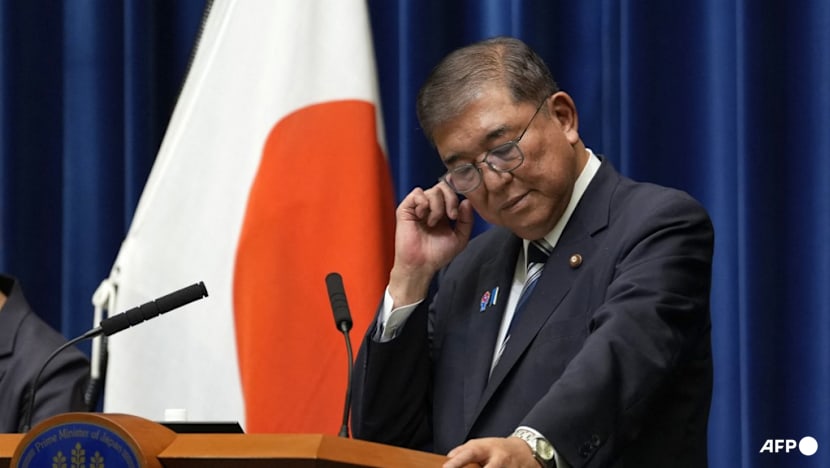Commentary: Japan deserves far better leadership than this
After weeks of speculation, Shigeru Ishiba is finally stepping down. The next head must restore the LDP’s centre-right credibility, says Gearoid Reidy for Bloomberg Opinion.

Japan's Prime Minister Shigeru Ishiba attends a press conference at the prime minister's office in Tokyo on Sep 7, 2025. (Photo: Toru Hanai/Pool/AFP)
TOKYO: Japan’s ruling bloc was desperate. Hammered by scandals and sinking ratings, the Liberal Democratic Party gambled on a new leader less than a year ago. They chose Shigeru Ishiba. And to quote what Michael Caine’s Alfred Pennyworth said of the Joker in 2008’s The Dark Knight, in their desperation they turned to a man they didn’t fully understand.
Ishiba, who after weeks of speculation announced his resignation on Sunday, is no Joker. But he will be remembered as something of a punchline – and his time in power one of tumult that has threatened to reduce the country’s international standing at a moment of global transformation.
The premier was always an enigma, and got the job only because the kingmakers preferred him to the alternative, the arch-conservative Sanae Takaichi. But few could have foreseen that a man who spent his entire career seeking leadership would have so flimsy a plan that he would lose three elections in less than a year. Right-wingers have deserted the party, and his initial refusal to step down threatened to split it in two.
His main economic idea to fight inflation was an unwanted US$135 one-time handout that never materialised. His premiership has been bogged down dealing with the threat of US President Donald Trump’s tariffs. The deal Ishiba agreed to is unspectacular, and unbefitting of Japan’s special relationship.
Now, while the country is mostly back where it was a year ago, the LDP is in a much weaker position. It has lost majorities in both houses of parliament. Ishiba so alienated its conservative wing that right-leaning voters’ abandonment should have been obvious. While the rise of the far-right in Japan has been hugely overstated, the next head must restore its centre-right credibility.
CAN LDP RISE TO THE CHALLENGE?
The question now is can the LDP rise to the challenge. A Kyodo poll released Sunday, taken before the resignation was reported, showed 83 per cent believe the LDP’s very public reckoning with its defeat won’t boost voters’ trust.
Yet the party has come back before. In the early 2010s, some considered it to be a spent force before the then-unlikely figure of the late Shinzo Abe re-emerged to unite it. Is there such a visionary now?
Talk will be of the two obvious candidates, Takaichi and Agriculture Minister Shinjiro Koizumi. Takaichi is a likely frontrunner, having narrowly lost to Ishiba last year. She’d be Japan’s first female prime minister, and would certainly stem the problem of conservatives ditching the party.
She’d also get along well with Trump, and as the self-declared heir to Abenomics, the stock market would like her – though her expansive fiscal plans would likely fuel further rises in bond yields, at a time when long-term rates are at multi-decade highs.
But it’s Koizumi who has had the more impressive year. He stepped in as farm minister during the historic rise in rice prices, and quickly engineered a market reversal. Despite his inexperience, he has again played kingmaker: His meeting with Ishiba on Saturday was among the last the prime minister reportedly took before deciding to step down.
An outside bet is also an option, with eyes on the likes of the more centrist conservative Takayuki Kobayashi. But before the who will come the question of how. The LDP may choose the quick option of polling lawmakers and regional heads, which could mean a new prime minister in days. Or it might opt for a “full-spec” election in which party members also join, which would take weeks.
In either case, a new leader will then face a choice of whether to call a snap election and try to recover the majority in the lower house – or risk losing power entirely, ushering in a level of political instability unseen for decades.
THE COUNTRY REQUIRES VISION
However it decides, the LDP must find a leader who has genuine popularity both in and outside the party. Japan can, and indeed has, kept things ticking over during long periods of political drift; the bureaucracy has survived weaker premiers than Ishiba, though not many.
But now more than ever, the country requires vision. Its ageing society, shrinking workforce and huge debt remain. But they are now joined by the strongest inflation in decades and a newfound worry over immigration. Add to that concerns that the US is abandoning its traditional role as security guarantor at a time when China and Russia are increasingly aggressive, and a strong leader is a must.
No one knows this better than the electorate. The LDP might not deserve a better kind of leader. But the country certainly does.














